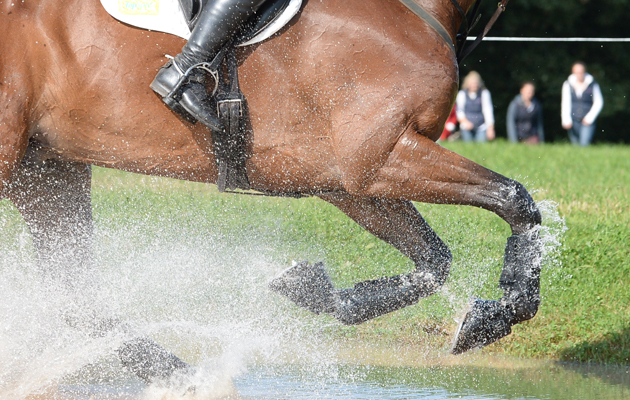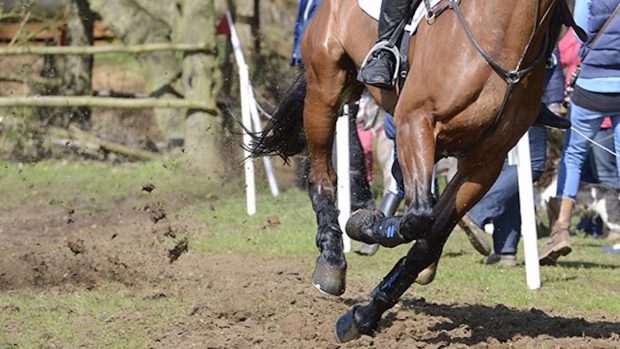Changes to faller and jacket regulations are among British Eventing’s (BE) rule changes for 2018.
H&H has already reported news of updates to body protector standards, changes to hat tags and the prize money and entry fee increases.
BE has today (20 December) released a full summary of changes to the BE Rules and Members’ Handbook which will come into effect from 1 January.
Competitors up to and including intermediate level are no longer “confined” to black, dark blue or tweed jacket — they may choose “any single conservative colour in muted tones”, or can opt to ride without a jacket altogether.
If a rider falls during the showjumping phase, the bell will be rung and the clock stopped while they remount and the jump is rebuilt — six seconds will be added to the competitor’s time and the 45-second rule (elimination for failing to jump the next obstacle within 45 seconds) will not apply.
The bell will be rung and the clock restarted once the competitor has remounted.
Riders falling on the cross-country course must now be checked by a paramedic or doctor before they are allowed to remount and continue.
Also new for this year is the rule that competitors must seek permission from the organiser before bringing a non-competing horse on to the event site. On arrival, they must then register that horse with the secretary, who will give him a number, which must be displayed as a bridle number — provided by the person responsible for the horse.
Pony Club members will also be able to use a qualifying result in the 100cm section at the Pony Club Championships as one of their minimum eligibility requirements for BE novice events.
Another amendment is that any level of horse can compete at BE105 level. This was previously restricted to grade three and grade four horses (horses with up to 20 BE points).
Article continues below…
You might also be interested in:

British Eventing reveals new body protector rules
“BETA 2000 has served us well since its introduction in 2000, however now there are garments potentially being used that

Annoyed by rise in entry fees? Here’s what it really costs to run a horse trials
Farley Hall Horse Trials' event organiser relays just how much it really costs to put on an event
The major changes are as follows and full details can be found here:
- BE105 classes will be open to all grades of horses.
- BE will no longer permit the use of BETA Level 3 body protectors with a 2000 label, although Exo BodyCages protectors will be allowed. If an ExoBody Cage is worn, this must be declared to the event secretary prior to the cross-country phase.
- At intermediate level (excluding the intermediate championships) and below, jacket colours are no longer confined to black, dark blue or tweed and may be any single conservative colour in muted tones, or, competitors may choose to ride without jackets. Competitors may choose to wear a fitted waistcoat in any conservative colour in muted tones. If no jacket is worn a suitable long/short sleeved shirt that fastens at the neck (white or cream and not bright or multi-coloured) must be worn.
- A competitor who falls during the cross-country phase must not remount until they have been checked by a paramedic or doctor.
- In the event of a rider fall during the showjumping round, the bell will be rung and the clock will be stopped while the rider remounts and the jump rebuilt (if necessary). Six seconds will be added to the competitor’s time. The 45 second rule will not apply.
- Pony Club members who achieved a qualifying result at the PC100 eventing championships in the current or preceding year may use this as one of their minimum eligibility requirements towards competing at BE novice level. Proof must be provided to BE as this will not be automatically recognised by the system.
- The “withdrawal date” has been renamed the “entry amendment date” to avoid misconception that refunds are due to those who withdraw by this date. Please see the refund policy in the event schedule for information on refunds for withdrawn entries.
Entries made pending qualifications will be subject to the minimum refund policy.
Withdrawals are final and may not be retracted. - Competitors wishing to bring non-competing horse(s) must seek permission from the event organisers and, once on site, competitors must register their non-competing horse(s) with the event secretary who will issue the horse with a number which must be worn by the horse at all times. A bridle number must be provided by the person responsible for the horse.
- British Eventing, British Riding Clubs and the Pony Club have unified their hat standards resulting in a single hat tag being accepted across BE, the Pony Club and British Riding Club events in 2018. The new ‘aqua’ coloured hat tag will carry the logo of the body that checks the hat.
- BE will no longer accept the AS/NZS 3838 [helmet] standard prior to 2006.
- Rowel spurs will be permitted in all phases (although not for young horse classes). Rowels may be horizontal or vertical but must be smooth, round and free to rotate.
- Wavy snaffles will no longer be permitted for dressage.
- Prize money and entry fees have increased by 5%.
- Three new dressage tests have been introduced (BE90 championship test, BE100 championship test and BE novice test).
- New eligibility rules for the Scottish Championships have been devised.
- From 1st January 2018 personal accident insurance will no longer be a benefit for full members. A statement from BE added: “This insurance offered limited benefit to members and therefore very few were able to claim under the policy, however a comprehensive offering is available via KBIS which BE members can enjoy at a competitive rate.”
.
.
What do you think about the new rules? Share your thoughts by emailing hhletters@timeinc.com – please include your full name and address
For all the latest news analysis, competition reports, interviews, features and much more, don’t miss Horse & Hound magazine, on sale every Thursday




